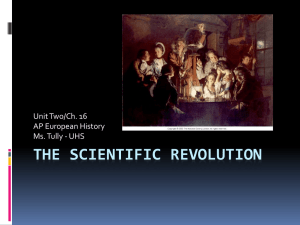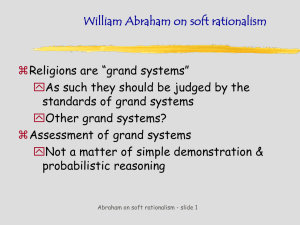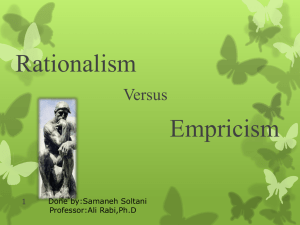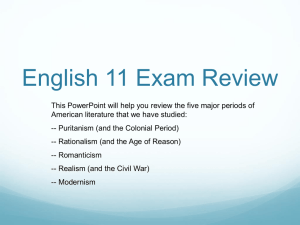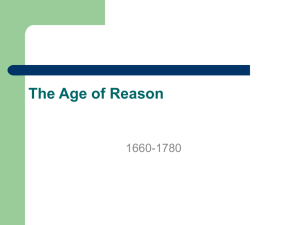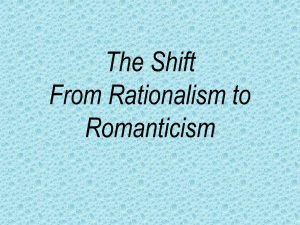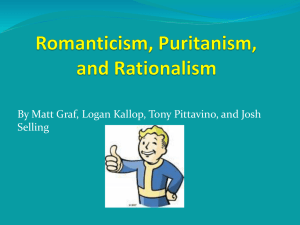A Fundamental Problem of Rationalism
advertisement
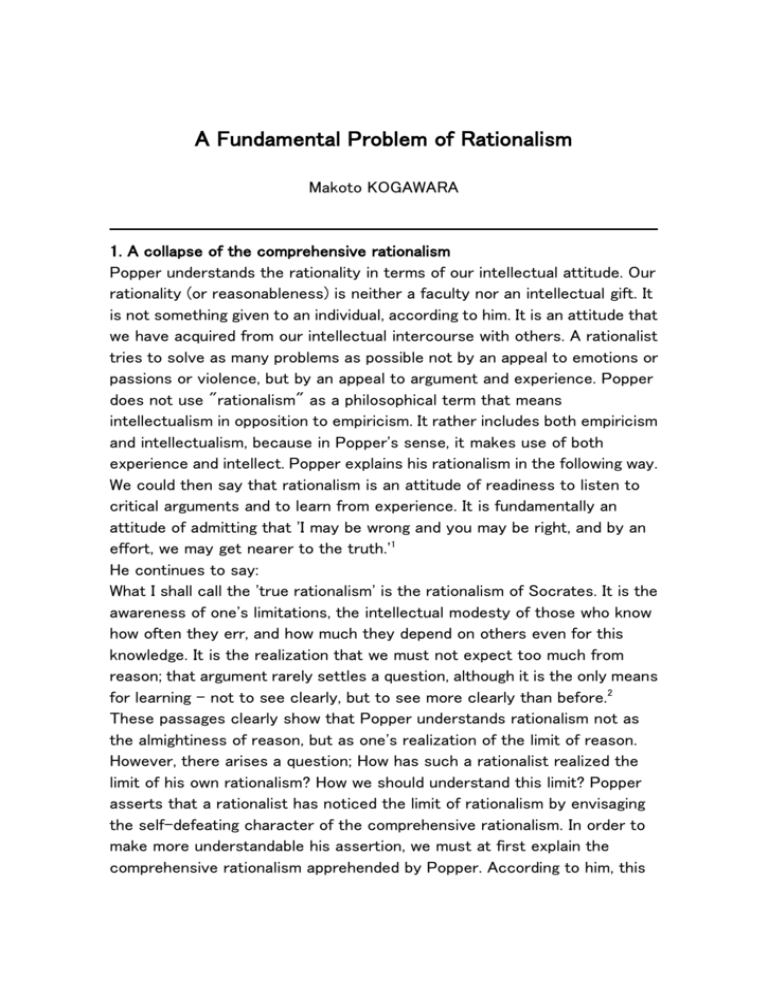
A Fundamental Problem of Rationalism Makoto KOGAWARA 1. A collapse of the comprehensive rationalism Popper understands the rationality in terms of our intellectual attitude. Our rationality (or reasonableness) is neither a faculty nor an intellectual gift. It is not something given to an individual, according to him. It is an attitude that we have acquired from our intellectual intercourse with others. A rationalist tries to solve as many problems as possible not by an appeal to emotions or passions or violence, but by an appeal to argument and experience. Popper does not use "rationalism" as a philosophical term that means intellectualism in opposition to empiricism. It rather includes both empiricism and intellectualism, because in Popper's sense, it makes use of both experience and intellect. Popper explains his rationalism in the following way. We could then say that rationalism is an attitude of readiness to listen to critical arguments and to learn from experience. It is fundamentally an attitude of admitting that 'I may be wrong and you may be right, and by an effort, we may get nearer to the truth.'1 He continues to say: What I shall call the 'true rationalism' is the rationalism of Socrates. It is the awareness of one's limitations, the intellectual modesty of those who know how often they err, and how much they depend on others even for this knowledge. It is the realization that we must not expect too much from reason; that argument rarely settles a question, although it is the only means for learning - not to see clearly, but to see more clearly than before.2 These passages clearly show that Popper understands rationalism not as the almightiness of reason, but as one's realization of the limit of reason. However, there arises a question; How has such a rationalist realized the limit of his own rationalism? How we should understand this limit? Popper asserts that a rationalist has noticed the limit of rationalism by envisaging the self-defeating character of the comprehensive rationalism. In order to make more understandable his assertion, we must at first explain the comprehensive rationalism apprehended by Popper. According to him, this type of rationalism claims to satisfy the requirement: A rationalist is "not prepared to accept anything that cannot be defended by means of argument or experience."3 But just on this point Popper raises a question: Can this rationalism itself be supported or defended "by means of argument or experience"? He is raising a question of self-application of the whole idea of comprehensive rationalism. Popper asserted that the comprehensive rationalism couldn't be defended by argument. It is not justified by its own requirement. I will try to explain Popper's conclusion below. When confronted with the problem of self-application of the comprehensive rationalism, we cannot certainly accept an argument supporting comprehensive rationalism unless we have already accepted it. Only if we have beforehand accepted its requirement, can we accept the argument supporting it. Therefore it is undeniably meaningless to argue for an adoption of the comprehensive rationalism in the presence of those who have already accepted its principle. If its requirement has not been accepted, then one needs to accept neither any arguments nor those of a certain kind. Therefore it is useless to present arguments. Those who do not admit any value of argument as such, will not pay any attention to the argument as such, including of course those of (comprehensive) rationalism. The comprehensive rationalists cannot defend themselves against the irrationalists. Since the requirement of comprehensive rationalists is inconsistent from the view of the self-application, it prohibits them to accept their own rationalism precisely according to their own principle. Hence the comprehensive rationalists are compelled to discard their own rationalism by the force of arguments. This is very paradoxical and defeats the comprehensive rationalism completely. Where can we find the causes of this paradoxical situation? Popper points that the comprehensive rationalist presupposes an extraordinary assumption. That is to say, the comprehensive rationalist requires that no assumption should be accepted without argument. This requirement amounts to the presupposition that we should argue without any assumption, and also to the presupposition that we can proceed on this way and lead to significant results. Simply speaking, this requirement is itself very audacious and indeed colossal. Can we argue without any assumption? The requirement of the comprehensive rationalism is in fact a kind of contradictio in adjecto. There is no doubt that we cannot argue without assumption, simply because the argument itself is not anything other than the logical deduction from some assumptions. If we attempt to prove these assumptions, we cannot fail to introduce new assumptions, which contain the previous assumptions as their consequences, insofar as we try to evade the logical circulation. Otherwise it will inevitably lead to the infinite regression. How can we solve this difficulty? Surely the comprehensive rationalism cannot settle it. Popper has already concluded, as we have seen, that it is impossible to justify the comprehensive rationalism according to its own requirement. Therefore he asserts: Whoever adopts the rationalist attitude does so because he has adopted, consciously or unconsciously, some proposal, or decision, or belief, or behavior; an adoption which may be called 'irrational'. Whether this adoption is tentative or leads to a settled habit, we may describe it as an irrational faith in reason.4 Popper plainly admits that rationalism is based upon faith in reason and that this faith is in its turn irrational because it is not rationally given at its base. He cannot deny a fact that rationalism cannot blow away its own irrational elements. In other words, rationalism cannot be comprehensive. Popper thought that the comprehensive rationalism overlooked this important point. As a consequence, as soon as the irrationalists point out the limit of the comprehensive rationality by making use of argument, the comprehensive rationalism gets defeated by its own chosen weapon, argument. 2. Problematics of Popper's critical rationalism I suppose there are many people who doubt Popper's presumption that the irrationalists do make use of argument. So it is good for me to make remarks on the irrationalists depicted by Popper. The irrationalism is, for Popper, a position that does not commit to any argument and even worse to logic. The irrationalists are entirely free to reject the argument in general or in particular, according to him. They use argument only if they think that it is useful or advantageous for them to do so, but if they do not think so then they refuse any argument. They make use of argument, for example, to combat against rationalists only insofar as the rationalists admit the importance of arguments and think indispensable. But they do refuse any arguments in the case that they are obliged to discard at least one of their irrational positions by arguments themselves. The fact that they neither pay any respect for the argument and logic nor care a bit to logical contradictions makes them in fact irrationalists. Popper's critical rationalism in its original form openly recognizes a fact that the rationalism cannot be based upon reason on one hand, and at the same time a fact that "the fundamental rationalist attitude is based upon an irrational decision, or upon faith in reason."5 Popper says that we are in front of the alternative, that is, that we are free to choose either the critical rationalism or the irrationalism. In addition to this, he considers this choice as a moral decision. Consequently he presented to us an argument which encourages us to adopt the critical rationalism and to reject the irrationalism.6 His argument was simple. He compared in details the consequences resulted from the adoption of irrationalism with the ones resulted from the adoption of critical rationalism, and showed many evils of the irrationalism and equally many merits of critical rationalism. On the ground of these comparisons he recommended us to adopt critical rationalism. This argument seems me to persuade nobody except those who have already accepted rationalism and are prepared to listen to arguments. Only those people who beforehand accepted the principle that argument should be accepted can accept Popper's argument. His argument has no power to persuade the irrationalists to listen to his argument. As a result, Popper cannot justify his own critical rationalism, just as the comprehensive rationalism cannot justify its own rationalism by its own arguments. Popper's critical rationalism is fideistic or decisionistic in its character. Although Popper is very frank and candid in recognizing the limit of his critical rationalism, it is clear that he cannot prohibit others to adopt different faith from his faith in reason. Popper cannot criticize them on the reason that they adopt other positions than his. Popper cannot help admitting their freedom of choice, even their adoption of irrationalism. There possibly appears the world of relativism. 3. Nonjustificational critical rationalism To tell the truth, it was noticed in 1960s that there was a principal difficulty precisely in the kernel of Popper's critical rationalism. It was W.W.Bartley, a student of Popper, who made this difficulty open to our eyes and made an audacious attempt to eliminate it completely. In the following I will try to show briefly the outline of his attempt. Bartley thought that Popper made unnecessarily an "minimum concession to irrationalism"7 because of his outspoken recognition that an argumentative justification of critical rationalism is obviously impossible. But Bartley also thought that Popper's analysis was not based upon the exact analysis of the situation, which brought about this difficulty. He clearly envisaged a kind of confusion in Popper's analysis. According to Bartley, Popper's misunderstanding of the situation consists in his unwarrantable identification of the rationality with the justifiability. Hence Popper could not see another possibility of the rationality which originates from a natural expansion of his own falsificationism. Before going to a further exposition of Bartley's argument, it is convenient to introduce a new term, justificationism. It is a name for the position that equates the rationality with the justifiability. From this perspective Popper's critical rationalism is a miscarried version of justificationism. Bartley thought that all the difficulty lies in the justificationism. Justificationism leads to the invincible predicament, if it were executed to its end. In order to justify a position, we need a justificational reason, but this reason in its turn requires further a new justificational reason. Therefore there arises logically an infinite regression of the justification. I might be permitted to refer to a passage from the Outlines of Pyrrhonism. ......the man who says that something true exists will not be believed without proof, on account of the controversy; and if he wishes to offer proof, he will be disbelieved if he acknowledges that his proof is false, whereas if he declares that his proof is true he becomes involved in circular reasoning and will be required to show proof of the real truth of his proof, and another proof of that proof, and so on ad infinitum......8 Secondly if reason A is based upon reason B but B is justified by A, then there is a circulation of justification. Descartes once said in his Meditations: It is of course quite true that we must believe in the existence of God because it is a doctrine of Holy Scripture, and conversely, that we must believe Holy Scripture it comes from God.9 Thirdly there is an arbitrary interruption of justification. If it occurs on a stage of the procession of justificational procedure, nobody will admit that the positions or statements in question have been justified. As an example I can show a passage from Walter Lippmann. And if you ask why the test of evidence is preferable to any other, there is no answer unless you are willing to use the test in order to test it.10 It is rather well known that H. Albert, a German critical rationalist called this predicament the Muenchhausen Trilemma. Bartley thought that Popper's critical rationalism is a result of an arbitrary interruption (breaking-off) of justification of the rationalism. Popper unconsciously presupposed that the rationalism requires justification but at the same time he clearly took an insight of its logical impossibility. This impossibility compelled him to make a "minimum concession to irrationalism which I [Popper] have termed 'critical rationalism '".11 However, there is an another way to come out of this predicament. If a justificational procedure inevitably leads to the Muenchhausen Trilemma, then there is a possibility to ascribe the cause of this predicament to the justificationism itself. Although the justificationists firmly believe in the feasibility of justification, it is simply impossible to execute this procedure to its end because of its logical impossibility (Trilemma). But this error was commonly committed both in the rationalism and in the comprehensive rationalism. The justifiability was mistakenly confused with the rationality itself. As soon as Bartley envisaged this point, he proposed to discard all the justificational elements from the rationalism, especially from critical rationalism. But how did he accomplish it? After having blown away the justificational elements, what does there remain? He has introduced an idea of the nonjustificational criticism on the basis of the sharp distinction between the justification and the criticism. In order to explain his idea it is good at first to take up a case where this distinction does not exist. In such a case, we may suppose that A criticizes B's assertion. A's criticism necessarily invites B to ask the reason why A criticizes B. Further, we may safely suppose that B is permitted to criticize A's reason. But B's criticism in its turn invites A to ask the reason on which B criticized A's reason. They will go on criticizing each other, if they make neither a mutual consensus nor a compromise. Rather, it is hopeless for them to make a consensus or a compromise, since they strongly want to prove rightness of their own position by a justificational procedure. Their mutual criticism easily leads them to confront the Muenchhausen Trilemma of the infinite regression, logical circulation and interruption of the justification, since they are, consciously or unconsciously, under the sway of justificationism. Suppose they reached at a stage where neither A nor B can justify his own criticism, that is, neither can present a further justificational reason of his own criticism. If the one blames the other for the lack of a reason to justify his criticism, the other will behave himself in the same way. This constitutes the so-called tu quoque argument. This situation might lead them to adopt relativism on their mutual insight that both sides cannot justify its own final reason, namely, neither can do anything other than a breaking-off of justification. This means that a person who started off as a rationalist ends up as an irrationalist just through his own "rational" way of thinking. Such persons can we easily find almost everywhere. Now, it is high time to explain the idea of nonjustificational criticism in terms of the logical relationship of statements. Statements are vehicles of assertions, opinions, positions, views, theories, and so on. Needless to say, some statements are true and others are false. Even if we refrain from attributing the truth-value to the normative statements, we will be able to speak of the validity of such statements. If a statement is true, then its denial is false. If a statement is valid, then its denial is invalid. It is easy to understand that every statement interrelated logically to one another. For example, the statement that a whale is mammalian is not compatible with the statement that a whale belongs to the group of fish. If the one is true, then the other is false. They constitute always some kinds of logical relation. Sometimes we can easily find the incompatible relations between statements. Bartley thought that the criticism largely consists of pointing out the incompatible relation between statements (in the world 3).12 In this type of criticism it does not matter who, well known or unknown, criticizes statements or theories, though the names of successful critics are indexes by which we are in thanks able to remember the incompatibility between the statements or between the theories. In concluding this paragraph, I may say that the nonjustificational criticism is for Bartley no other than the pointing out of the incompatible relation between statements. Here we should notice that it is very easy in principle to point out for any statement a statement that stands in incompatible relation to that statement. The simplest way to do this is to make a denial of the statement in question.13 This means that every statement is in principle criticizable. For example, to criticize other party's assertion means to hold open to criticism one's own position which he tentatively holds and uses in order to support his own position. We cannot be exempt from criticism. We cannot stand on the firm and immovable ground that nobody can shake by means of criticism. On the contrary, justificationists believe that there must be a privileged and uncriticizable statement upon which a justified intellectual edifice should be built up. They do not realize that the so-called uncriticizable foundation for justification is no other than an illusion, just as the Archimedian fulcrum of the lever by which, it is said, Archimedes considered himself to move the earth. However, once the nonjustificational criticism has been separated from the justificationism, we can safely discard the latter without being intellectually injured. There remains us an idea of nonjustificational criticism. An abandonment of justificationism leads neither to Trilemma, nor to decisionistic relativism. On the other hand, we can go on discussing any problem, statement or position by using nonjustificational criticism. There is no space for justificationistic relativism, which mocks the idea of the mutual criticism. Instead of relativism, the nonjustificational criticism gives rise to critical pluralism, which encourages the mutual criticism as a driving force for the growth of knowledge. It is a good tool for searching truths. Therefore Bartley recommended us to discard the justificationism completely and to salvage the idea of nonjustificational criticism. Now we can see more clearly two kinds of rationality than before. RATIONALITY justifiability should be discarded (nonjustificational) criticizability should be kept on Now let's remember Popper's "minimum concession to irrationalism." What does it look alike from our newly acquired perspective of nonjustificationism? We can retrospectively envisage that the impossibility of the justification of the rationalism led him to his concession. However, after the justificationism has been completely abandoned, how does our problem situation look alike? We can say safely, Popper's concession is unnecessary because the justificationism is only an illusion and every statement is criticizable. Our choice does not lie in the alternative between the comprehensive rationalism and the critical rationalism, but in the alternative between the justificationism and the nonjustificationism. In Popper's original argument these two kinds of choice were mixed and interfused. However, we should not forget a fact that Popper rightly apprehended the rationality as the critical attitude. Also I think, it is my duty to remind you of a fact that Popper does not base his falsificationism upon an uncriticizable adoption of basic statements in his Logik der Forschung (The Logic of Scientific Discovery). In his falsificationism theories and basic statements are in principle mutually criticizable, so there is no fixed and immovable foundation to support a justificationistic tendency. To support my assertion I may quote a passage from The Logic of Scientific Discovery. Every test of a theory, whether resulting in its corroboration or falsification, must stop at some basic statement or other which we decide to accept. If we do not come to any decision, and do not accept some basic statement or other, then the test will have led nowhere. But considered from a logical point of view, the situation is never such that it compels us to stop at this particular basic statement rather than at that, or else give up the test altogether. For any basic statement can again in its turn be subjected to tests, using as a touchstone any of the basic statements which can be deduced from it with the help of some theory, either the one under test, or another. This procedure has no natural end. Thus if the test is to lead us anywhere, nothing remains but to stop at some point or other and say that we are satisfied, for the time being.14 Therefore I think that Bartley's version of critical rationalism is only a natural expansion or clarification of Popper's nonjustificational falsificationism (fallibilism). It seems to me that the brutality and severity of his wartime might have produced his decisionistic tendency in The Open Society and its Enemies, which was written during the World War ll. Let's return to the main course of my argument and sum up the reasons why we should discard the justificationism. First it cannot justify itself despite its own requirement that the reasonable position should be justified, while the nonjustificationism does not have such a requirement. Secondly the justificational procedure is not feasible because of its inevitability of the logical predicament such as Trilemma. Thirdly to throw the justificationism into the discard brings about no harm to our critical discussion and rather contributes to its advancement. The nonjustificational critical rationalism can open a new horizon where the growth of knowledge is facilitated. The problem whether critical rationalism can be justified has disappeared, once the justificationism has been discarded thoroughly. Since every statement or position is criticizable, we are in principle qualified to criticize those who made different choice than Popper's. Now the problem has shifted to the new problem whether the nonjustificational critical rationalism survives severe criticism (examination).15 But this problem is still an open question, to my knowledge. Insofar as it is not refuted, we will be able to hold it. 4.Upward rationality Instead of examining the academic problem whether the nonjustificational critical rationalism has made a failure or not, here it is good for us to depict its concrete image in our ordinary life. By working on this task we may hope to contribute to a better understanding of the nonjustificational critical rationalism. The idea of nonjustificational criticism rests in reality on a model of falsificationism. An empirical falsification usually proceeds from the falsity of the consequences (for example, a failure of a prediction) to the falsity of the premises - a set of theories and initial conditions. This idea originally rests on the logical principle of the retransmissibility of the falsity. This principle is expandable to the nonempirical fields of knowledge or to the normative fields. We can understand the falsifiability as part of the criticizability. If consequences are criticizable then the premises are also criticizable insofar as the logical deduction is valid. If we find some errors in the consequences, we may infer that there must be some errors in the premises. This process proceeds from the consequences (bottom) to the presuppositions in upward way. Here let's remember that the assumptions constitute the foundation from which one can start justifying the consequences. A logical deduction is a kind of justification. If presuppositions are true, valid, empirical, highly provable, reliable and so on, then the consequences must have also same qualities, i.e., true, valid, empirical, highly provable, reliable and so on. The qualities of the assumptions (or foundations) are transmitted by logical deduction to the consequences. This is a downward rationalization (justification) or simply a downward rationality. However, this type of rationality is indeed problematic and even erroneous. For it is possible that the mixed bad qualities of the foundation are inherited by the consequences just through the downward rationalization. Logical deduction cannot exclude such possibilities. On the contrary, the falsifiability or criticizability shows clearly a quality of the upward rationality. It proceeds only from the invalidity of the consequences (bottom) to the invalidity of the assumptions (or foundations), not vice versa. Its aim is to remove the deficiencies. According to the upward rationality it is in fact rational to criticize the foundation which justificationism supposes to be privileged and immune from any criticism. I believe we can more explicitly comprehend the difference between the downward rationality and the upward rationality in the context of our ordinary administrative or political context. Take an example. In our daily life we sometimes encounter the troubles brought about by a certain regulation. Of course we do criticize that regulation by referring to those troubles. But to our criticism the bureaucratic authorities usually mention a certain kind of law that can give a justification to that regulation. And when we point out the problematic effects of the laws, the authorities or the bureaucrats try to justify the laws by an appeal to the majority of the parliament. The authorities in most cases try to justify the concrete execution by an appeal to the upper enactment and try to conceal the erroneous effects from our eyes. Consequently, they tend to result in avoiding a careful examination of the concrete effects, which the execution of policies might have brought about. The authorities and bureaucrats are largely under the sway of the downward rationality and love a reductionistic way of thinking. And if the downward rationality is firmly believed to the one and only rationality in our world, as justificationists sometimes assert, then it is very difficult for almost all people to free themselves from the justificationism which avoids a careful examination of the concrete effects of policies. Even worse they are inclined to consider criticism as irrational act rightly from their viewpoint of justificationistic rationality. They presuppose that it is simply irrational and at open defiance to point out the errors and to criticize the authorities. However, from the perspective of the nonjustificational critical rationalism it is the illusionary reductionistic way of thinking itself that is irrational and should be accused. If we remember that the one and only rationality is the upward rationality, we can safely say that it is indeed rational to point out the errors and to criticize the upper authorities in question. Of course the reason on which citizens or common people rely in their act of criticizing the consequences brought about by a regulation, for example, is itself neither ultimate nor exempt from criticism. There is no privileged final reason anywhere. It is simply rational to eliminate the errors and evil things directly. It is the upward rationality that activates our political sphere. When we comprehend Popper's critical rationalism from the perspective of nonjustificationism, it is obviously understandable that it greatly facilitates not only our civil and political activities but also our scientific activities of which I could not speak at all. In my opinion the nonjustificational critical rationalism embodies one of the most important and basic values in our civilization which has been historically cultivated in the West. notes 1 K. R. Popper, The Open Society and its Enemies, Routledge and Kegan Paul, fifth edition, 1966 (first edition: 1945), vol.2, p.225. 2 Ibid., p.227. 3 Ibid., p.230. 4 Ibid., p.231. 5 I am quoting this passage from the second revised edition (Princeton University Press, 1950, p. 417). Popper revised this passage. In the fifth edition we can read this: "the fundamental rationalist attitude results from an (at least tentative) act of faith - from faith in reason." This revision is very important from the perspective of the controversy between Popper and Bartley. See W.W.Bartley, "Theories of Demarcation between Science and Metaphysics," in: I.Lakatos and A.Musgrave ed., Problems in the Philosophy of Science: Proceedings of the International Colloquium in the Philosophy of Science, London 1965, vol.3 (Amsterdam: North-Holland Publishing Company, 1968), and the following discussions there on page 65-119. Bartley suggests in his "Reply" (on page 119 of the book above mentioned) that we should compare the two versions of Popper's "Utopia and Violence," that is, the original version in Hibert Journal, vol. 46, 1948, pp. 109-116, and its revised version (1962) in Popper's Conjectures and Refutations, Harper & Row, 1963, pp. 355-363. My comparative study of these two versions enables me to say that the revised paragraphs of "Utopia and Violence" are not marks of his attempt to clarify the lines, but of his attempt to attenuate his decisionistic tendency. Compare especially the page 113 of the Hibert Journal with the page 359f. of Conjectures and Refutations. See also the starred note 5 on page 37 of Popper's Logic of Scientific Discovery, Harper & Row, 1959. 6 See section 3-5 in the chapter 24 of The Open Society. 7 Ibid., p.232. 8 Sextus Empiricus, Outlines of Pyrrhonism, translated by R. G. Bury, London: William Heinemann LTD, New York: G.P. Putnam's Sons, Loeb Classical Library,1933-1949, book ll, 85, p.205. 9 Descartes, "Dedicatory Letter to the Sorbonne," Meditations on First Philosophy, in: The Philosophical Writings of Descartes, trans. by John Cottingham, Robert Stoothoff and Dugald Murdoch, volume 2, Cambridge University Press, 1984, p.3. 10 Walter Lippmann, Public Opinion, (New York: Harcourt, Brace and Company, 1922), p.123. 11 The Open Society, p.232. 12 But he does not think that the idea of criticism consists only of the idea of logical incompatibility (possible falsity). He understands the idea of criticism in a wider sense which includes the revisability of "necessary" truths. See section 14 of his "A Refutation of the Alleged Refutation of Comprehensively Critical Rationalism," in Evolutionary Epistemology, Theory of Rationality, and the Sociology of Knowledge, ed. by Gerard Radnitzky and W.W.Bartley, Open Court, 1987. 13 There is a big problem concerning with this point. As everyone knows that the denial of a tautological statement is undeniably a self-contradictory statement, so it seems to be impossible to criticize logical truths. However, Bartley thinks that logic is also criticizable. Cf. W.W.Bartley, The Retreat to Commitment, Open Court, 1984 and also see note 12 above. 14 K.R.Popper, The Logic of Scientific Discovery, Harper and Row, 1959, p. 104. I may also quote the following lines from this book. "Thus if the basic statements in their turn are to be inter-subjectively testable, there can be no ultimate statements in science: there can be no statements in science which cannot be tested, and therefore none which cannot in principle be refuted, by falsifying some of the conclusions which can be deduced from them." (Ibid., p. 47.) 15 There are severe controversies concerning about Bartley's argument. See, for example, J.W.N.Watkins, "Comprehensively Critical Rationalism," in Philosophy, vol.44 (1969), and his "CCR: A Refutation," in Philosophy, vol.46 (1971), and his "Comprehensively Critical Rationalism: A Retrospect," in Evolutionary Epistemology, Theory of Rationality, and the Sociology of Knowledge, ed. by Gerard Radnitzky and W.W.Bartley, Open Court, 1987. Also see J.Agassi, I.C.Jarvie and T. Settle, "The Grounds of Reason," Philosophy, vol.46 (1971), their "Towards a Theory of Openness to Criticism," Philosophy of the Social Sciences, vol.4 (1974), J.Agassi, "Rationality and the Tu Quoque Argument," Inquiry, 16(1973), and Bartley, "On the Criticizability of Logic - A Reply to A.A.Derksen," Philosophy of the Social Sciences, vol.10 (1980). See especially Evolutionary Epistemology, Theory of Rationality, and the Sociology of Knowledge above mentioned, which contains J. F. Post's three important contributions. See also Bruce W. Hauptli, "A Dilemma for Bartley's Pancritical Rationalism," Philosophy of the Social Sciences, vol. 21, no.1, March 1991, and David Miller, Critical Rationalism: A Restatement and Defence, Open Court, 1994.
